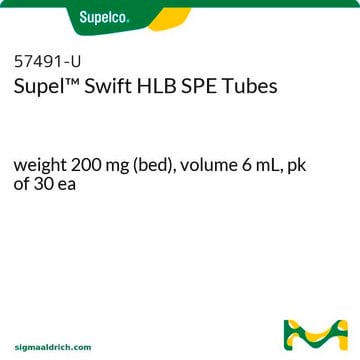66825-U
BIOshell A400 Protein C4 (3.4 μm) HPLC Columns
L × I.D. 10 cm × 2.1 mm, HPLC Column
Sinónimos:
Protein C4 Reversed-Phase Chromatography Column
Seleccione un Tamaño
965,00 €
Seleccione un Tamaño
About This Item
965,00 €
Productos recomendados
Nombre del producto
BIOshell A400 Protein C4, 3.4 μm HPLC Column, 3.4 μm particle size, L × I.D. 10 cm × 2.1 mm
Materiales
stainless steel hardware
Nivel de calidad
Agency
suitable for USP L26
descripción
Shell thickness (0.2 μm)
Solid Core (3.0 μm)
Línea del producto
BIOshell
Características
endcapped
fabricante / nombre comercial
BIOshell
envase
1 ea of
Extensión del etiquetado
0.4% carbon loading
Parámetros
600 bar max. pressure
90 °C max. temp.
técnicas
HPLC: suitable
LC/MS: suitable
UHPLC-MS: suitable
UHPLC: suitable
L × D.I.
10 cm × 2.1 mm
superficie
15 m2/g
cobertura de la superficie
4.2 μmol/m2
Matriz
spherical silica particle platform
superficially porous particle
grupo activo de la matriz
C4 (butyl) phase
tamaño de partícula
3.4 μm
tamaño de poro
400 Å
Intervalo de pH operativo
2-9
técnica de separación
reversed phase
¿Está buscando productos similares? Visita Guía de comparación de productos
Categorías relacionadas
Descripción general
Información legal
Producto relacionado
cartucho de precolumna
Elija entre una de las versiones más recientes:
Certificados de análisis (COA)
¿No ve la versión correcta?
Si necesita una versión concreta, puede buscar un certificado específico por el número de lote.
¿Ya tiene este producto?
Encuentre la documentación para los productos que ha comprado recientemente en la Biblioteca de documentos.
Artículos
Optimization of a Reversed-Phase Liquid Chromatographic (RP-LC) method for the intact analysis of a therapeutic monoclonal antibody, trastuzumab, using a BIOshell™ A400 Protein C4 column.
The article describes the use of difluoroacetic acid (DFA) as an effective alternative to acid modifiers, formic acid (FA) and trifluoroacetic acid (TFA) in the LC-UV/MS analysis of proteins.
A RPLC-MS workflow for mass analysis of reduced monoclonal antibody, trastuzumab, including reduction procedures, calibration, and system suitability tests.
A RPLC-MS workflow for mass analysis of non-reduced monoclonal antibody, trastuzumab, including calibration, and system suitability tests.
Protocolos
Larger porous shell particles in BIOshell™ columns improve efficiency in U/HPLC analysis of peptides and proteins.
BIOshell™ IgG 1000 Å C4 UHPLC Column for Improved Biomacromolecule Separations
HPLC Analysis of the Monoclonal Antibody (mAb) Erbitux (Cetuximab) on BIOshell™ A400 Protein C4
Contenido relacionado
HPLC separates and identifies large biomolecules like proteins and peptides by pumping the sample through a sorbent-packed column.
La HPLC separa e identifica biomoléculas grandes como proteínas y péptidos mediante el bombeo de la muestra a través de una columna rellena de adsorbente.
Filtros activos
Nuestro equipo de científicos tiene experiencia en todas las áreas de investigación: Ciencias de la vida, Ciencia de los materiales, Síntesis química, Cromatografía, Analítica y muchas otras.
Póngase en contacto con el Servicio técnico




